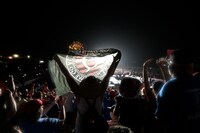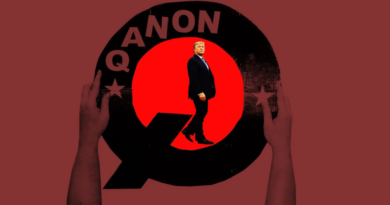An intimate view of how QAnon destroys families

Journalism about the QAnon phenomenon tends to examine the rampant spread of the vague set of conspiracy theories into mainstream society and perhaps wonders at the specific identities of those who propagate those theories from shady corners. “Trust the Plan,” by Will Sommer, who reported the story for the Daily Beast (and is now a writer for The Washington Post), and Cullen Hoback’s HBO documentary “Q: Into the Storm” traced the origins of Q to message boards like 4chan and Reddit and explored the damage ultimately wrought to our democracy by its disturbing proliferation.
In her assiduously researched and impeccably constructed new book, “The Quiet Damage: QAnon and the Destruction of the American Family,” Jesselyn Cook grapples with the personal ramifications for many of Q’s devotees and the people who care about them. It’s a subject often overlooked in what Cook describes as “the roaring national discourse surrounding the movement,” and “few resources exist for afflicted families and individuals.” Cook’s aim is to humanize those deeply committed followers who are so easy to dismiss as delusional or gullible or worse. She also hopes to answer the question she received in “a cascade of emails from strangers across the country sharing chilling” stories of those who abruptly recalibrated their identities around dedication to QAnon: “What happened to the person I love?”
Cook conducted hundreds of interviews to reconstruct how people fell under the spell of Q’s alluringly simplistic depiction of reality. Her diverse subjects include an empty-nest liberal lawyer, the twin of a Black Lives Matter activist, a rabid Bernie Sanders supporter, a retired baby boomer and a young family man.
The story of Emily and Adam — a mother and son whose lives were shattered by the suicide of family patriarch Dan, a tragedy that nevertheless fortified their bond — is particularly effective, as the about-face Emily made in the years after Adam, the youngest of three children, left for college was almost grotesquely extreme. Emily, who put herself through law school after her husband’s death and went on to thrive in her own practice, had been Adam’s hero; in his own application essay for law school, he wrote about his socially progressive mother, who he earnestly believed would make the world a better place. But isolated in her empty nest, Emily plagued her children with tweets and Facebook posts claiming that Mike Pence was a clone and that Michelle Obama was a man, and she rarely engaged with them on any other topics. Less than a decade later, they were estranged by Emily’s increasingly cruel behavior, which culminated in an email in which she “called Adam a ‘monster,’ a ‘huge disappointment,’ and an ‘utter embarrassment’” and told him to “shed my DNA.”
Kendra and Tayshia, the twins, grew up in low-income neighborhoods in Milwaukee. Though they were “best friends” in their youth, by adulthood they couldn’t have been more politically opposed. When Tayshia’s husband died of a heart attack, Kendra’s son blamed Tayshia for his death, because she had “made him” get the coronavirus vaccine. “You killed him,” he said to her. “Mom told me.”
Such sudden and complete shifts in personality and ideology have complex causes and even more complicated solutions. Cook understandably and wisely doesn’t crowd her book with psychological asides, preferring to allow the specificity of her subjects to speak for themselves. For additional insight, she does occasionally turn to historical sources like Viktor Frankl, Abraham Maslow and Gustave Le Bon. But the book would have benefited from more use of the many interviews Cook did with psychologists and conspiracy theory experts, whose words she largely reserves for an afterword rather than the main text. The intrusions of well-known concepts like Maslow’s hierarchy of needs or Frankl’s search for meaning might have been fruitfully substituted for more direct insights from the contemporaneous experts she consulted.
But overall, Cook contributes a vital piece to the vexing QAnon puzzle, chronicling the profound effects on those otherwise average people who have fallen into its grasp and the collateral damage done to those around them. People’s sense of the truth, as we painfully learn again and again, relies on more than verifiable facts. Beliefs like those espoused by QAnon — which are certainly inventive, if nothing else — can appeal to those for whom the truth is too banal to be riveting or too multifaceted to be comforting. Disinformation, provocative theories and silver-platter scapegoats have proved to be alluring alternatives to more people than we might have imagined. Cook’s book doesn’t offer solutions, but it sheds important light on the problem.
Jonathan Russell Clark has written about books for Esquire, the New York Times, the Los Angeles Times and others. He is the author of “Skateboard” and “An Oasis of Horror in a Desert of Boredom.”
The Quiet Damage
QAnon and the Destruction of the American Family
By Jesselyn Cook
Crown. 250 pp. $30


